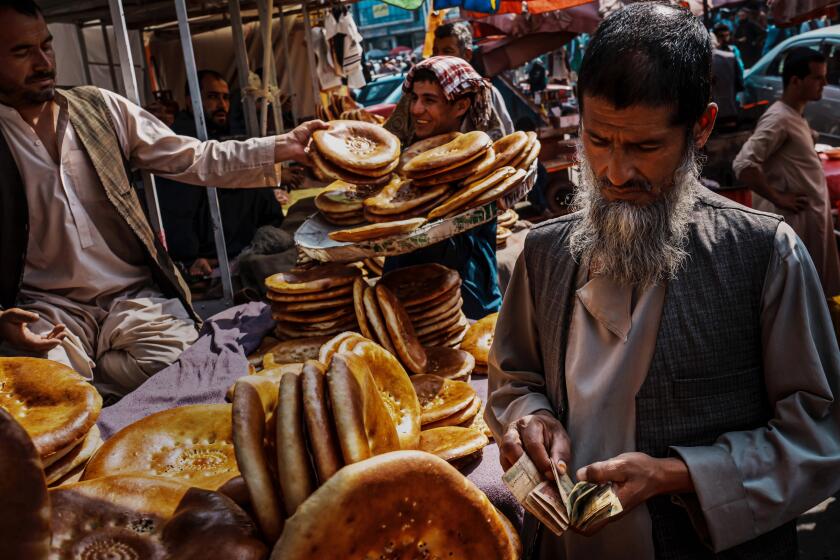
Constancy and consistency are the keys to a Kabuli restaurant serving chainaki, Afghanistan’s ultimate comfort food.
- Share via
KABUL — There’s a comforting immutability to the way Waheed Merzazadah prepares for his day’s work: the methodical cutting of the sheep carcasses down to the right size, the readying of the vegetables and spices, the patient poring over of his well-worn collection of chainaks, or teapots. Watching him in the one-room kitchen of his two-room restaurant, you see him embody a constancy in a country often defined by its lack, as he repeats the process by which he makes superlative chainaki.
What is chainaki? The neophyte would contend it’s nothing more than a hearty lamb stew, because it certainly looks like that. But the connoisseur knows that chainaki is less about the ingredients than it is about how, or more accurately in what, you cook them.
As the name implies, if you want chainaki, you’ve got to have the chainak, which serves as the perfect vessel for the hours of slow cooking the dish requires. And not just any one will do — it’s got to be clay, for it is only those teapots that produce the right thickness of the sauce, the melts-with-a-hard-stare tenderness of the meat and the silky texture of the sheep fat that make a proper chainaki.
Of course, if you intend to make it perfectly, and with the same consistency — day in, day out, seven days a week, no matter the time of year (except Ramadan) — that has made customers and co-workers bestow upon Merzazadah the honorific “ustad,” or master, you also need the willingness to engage in a routine of perpetual motion and attention. Oh, and time. Lots of it.
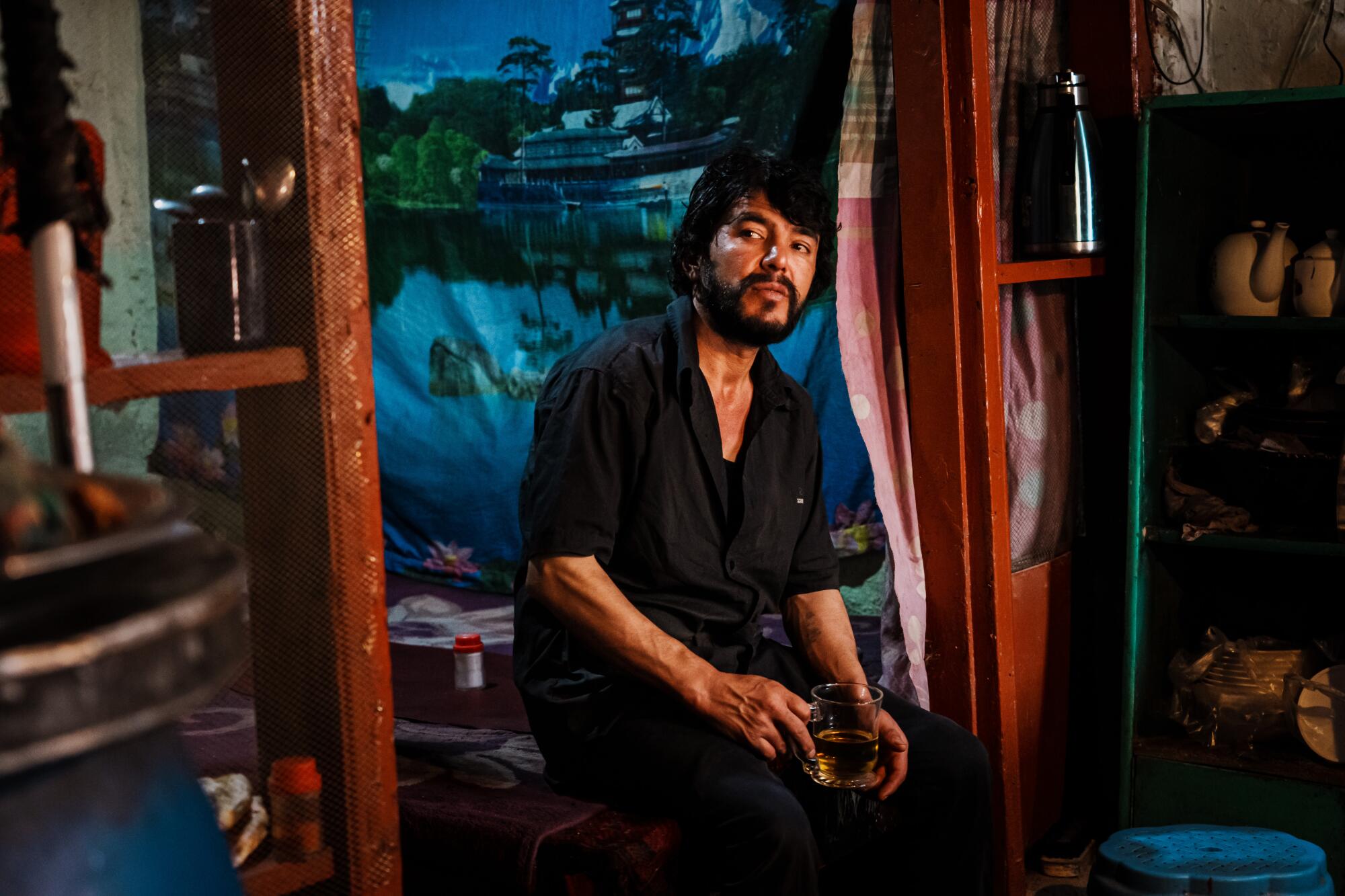
“I started when I was 13. By 25, I was ready,” Merzazadah says. A short, laconic 43-year-old with the air of an ascetic, he punctuates his sentences with long silences while keeping an eye on the hundreds of bubbling chainaks arrayed on the coal stove before him.
Despite the years of training, much of the restaurant is a testament to time’s irrelevance before the discipline of an unchanging craft: the sparse but functional decor, Merzazadah’s efficient, practiced movements around the bare-bones kitchen, the scratches and dulled patina of chainaks that have been in use for decades.
The restaurant has been a Kabul constant even as the city itself has been mired in conflict and changed hands multiple times. The wars between the mujahideen factions after the Soviet Union pulled out, the Taliban’s first stint in power, the U.S. occupation and now the Taliban’s return — none of it mattered, Merzazadah says. Even a rocket that struck the building 27 years ago failed to shut down operations.
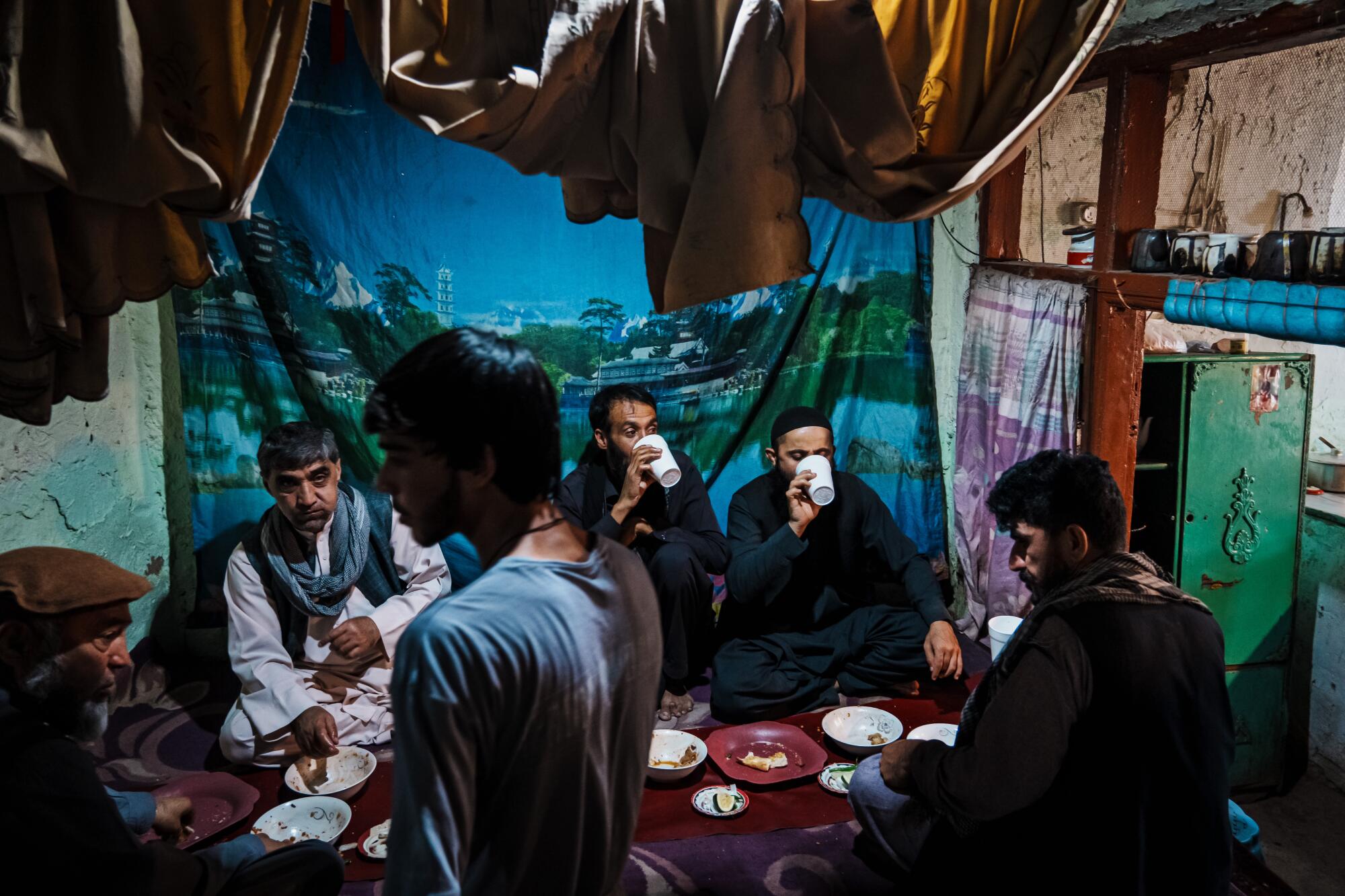
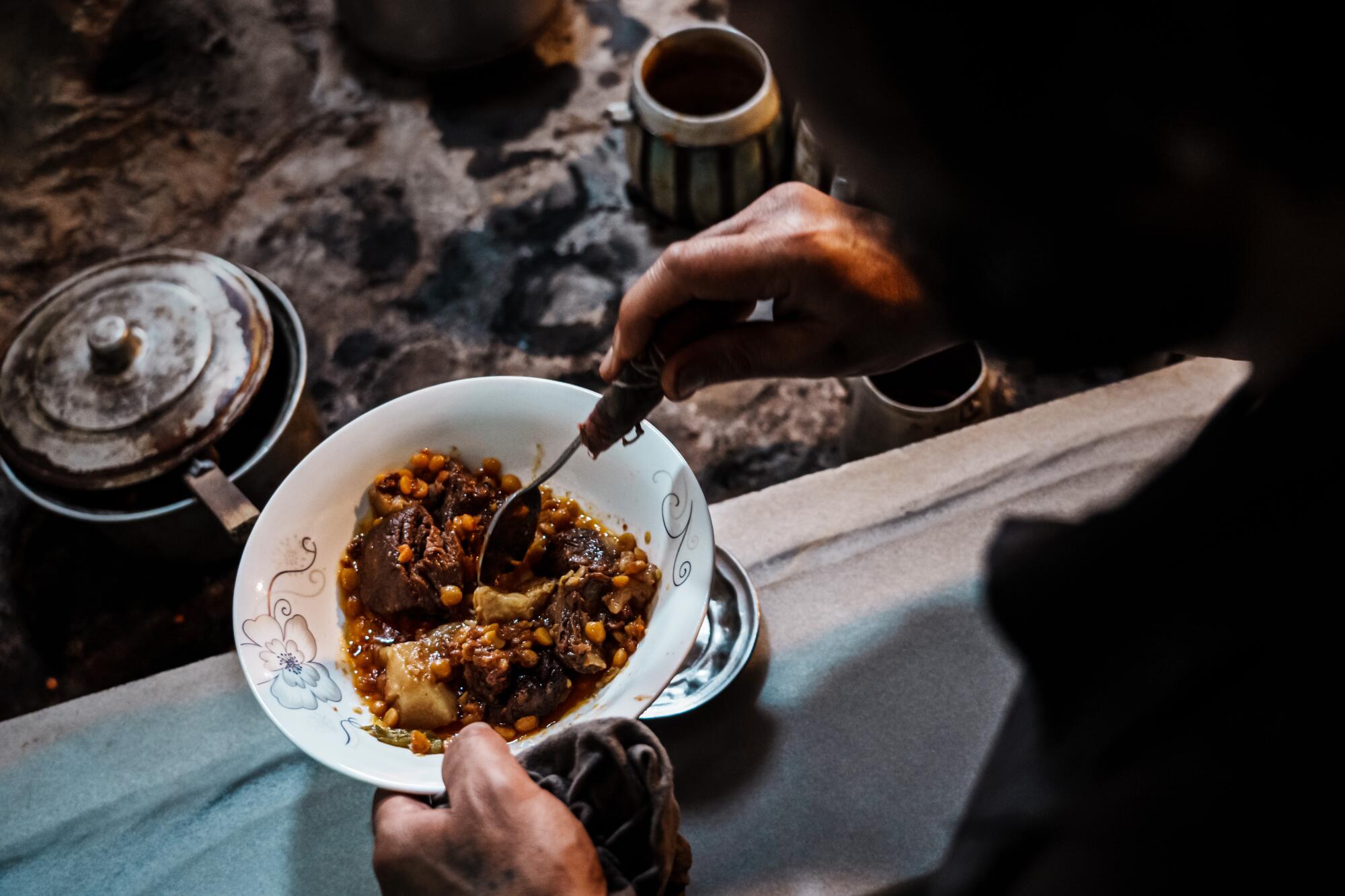
“We were here when it hit, but it didn’t blow up. We were back to work the next day,” Merzazadah recalls. “It’s still up there. I leave it as a memory, that we experienced those situations.”
Merzazadah’s path to learning his craft traces back to his father, Mir Mirza, a poor, illiterate man from the province of Panjshir. He made his way to Kabul some 70 years ago and opened his restaurant on the second floor of a dilapidated building in Mandawi bazaar. It served only one dish: chainaki. The only other menu item? Chai sabzi — green tea.
The place was a hit, drawing people from all parts of Kabul, and became known as “Bacha Broot,” meaning “boy with the mustache” in Dari, a reference to Mirza’s apparently magnificent facial accoutrement. Looking for an heir to continue the business, he turned to his son.
Merzazadah explains it simply: “I was in school until sixth grade, but I didn’t have much talent for learning. So I decided to join my father.”

When his father died, Merzazadah became the keeper of the family recipe, and a zealot about keeping the chainaki exactly the same as his father did it. By all accounts, he’s succeeded. The only concession to the changing times under the Taliban this year, customers say, is that the restaurant’s speakers play religious chanting rather than classical Afghan music, and women sit in a separate section. (The Taliban’s harsh interpretation of Islamic law includes proscriptions against music and mixing of the sexes.)
It’s perhaps a measure of the restaurant’s staying power that, even though the Afghan economy is in free-fall after last year’s U.S. withdrawal and the Taliban takeover, there’s still no guarantee you’ll get any chainaki if you opt for a late lunch.
Because of sanctions, economically stricken Afghanistan is now a cash-only society — but that’s a problem when its banknotes are falling apart.
The price, at 200 afghanis — more than $2 — a pop, isn’t cheap these days, but it’s worth it, customers say.
“I’ve been coming here for more than 35 years,” says 58-year-old Ezmarai Rasooli, busily demolishing a bowl of chainaki. He tells Merzazadah that he remembers when his father was in charge.
“I used to come here as a child because it was the best chainaki. The food is still great. If the taste changed, no one would come.”
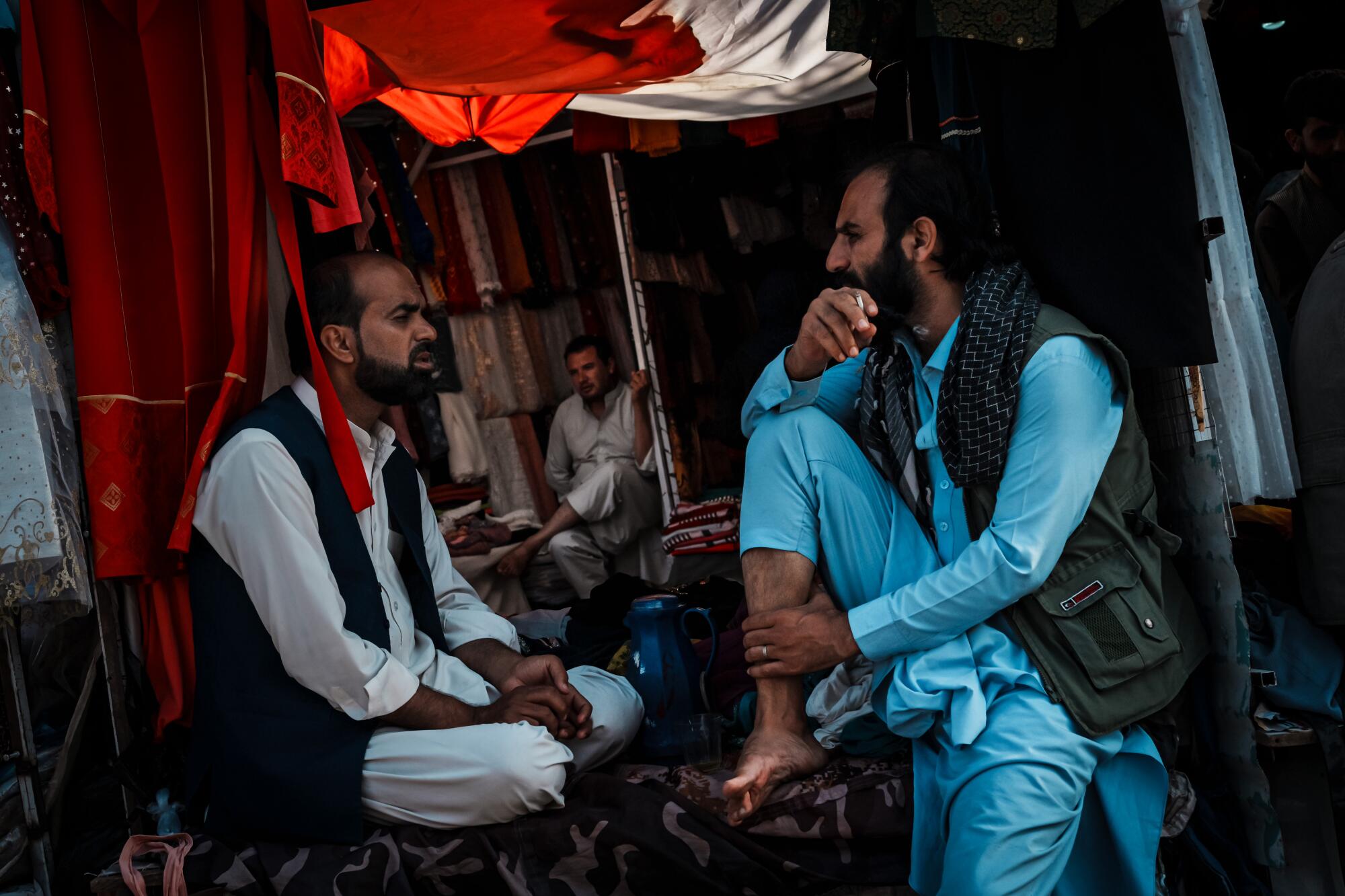
Achieving that taste isn’t easy. Ponder the process:
Merzazadah starts for work before the break of day, waking at 3 a.m. to walk through the empty passageways of the Mandawi market to the restaurant, where he takes out the meat pieces he cut the day before. He prepares split peas, tomatoes and onions, spoons them into the individual chainaks, lights the wood for the stove and then settles in for five hours of slow cooking. Because he uses no oil other than sheep fat, nothing interferes with the taste of the meat.
“Afghans, we love lamb meat. It’s like hashish for us — it makes you high,” he says.
Throughout that cooking time, Merzazadah never stops for more than a minute, dipping an exploratory spoon into the teapots or pouring in a bit of water to make sure they don’t scorch. For the finishing touch, he adds a spoonful of spices from a particularly large kettle on the side to each chainak, a special infusion whose makeup Merzazadah refuses to divulge, though you can glimpse the occasional shard of pepper or speck of garlic frothing in the mix.
A year of Taliban rule sees Afghanistan’s economy in ruins and hope and security for Kabul’s residents in short supply.
Merzazadah handles the teapots delicately. Most are from the time when his father was in charge; the oldest one is 40 years old. If they break, he has to repair them, because you can’t find chainaks with the same quality these days, he says. Otherwise, he has to use — heaven forfend — a metal teapot.
“It’s just not the same,” he says.
By noon, the roughly 250 chainaki portions the restaurant makes per day are ready, the sauce bubbling with an almost iridescent layer of melted fat.
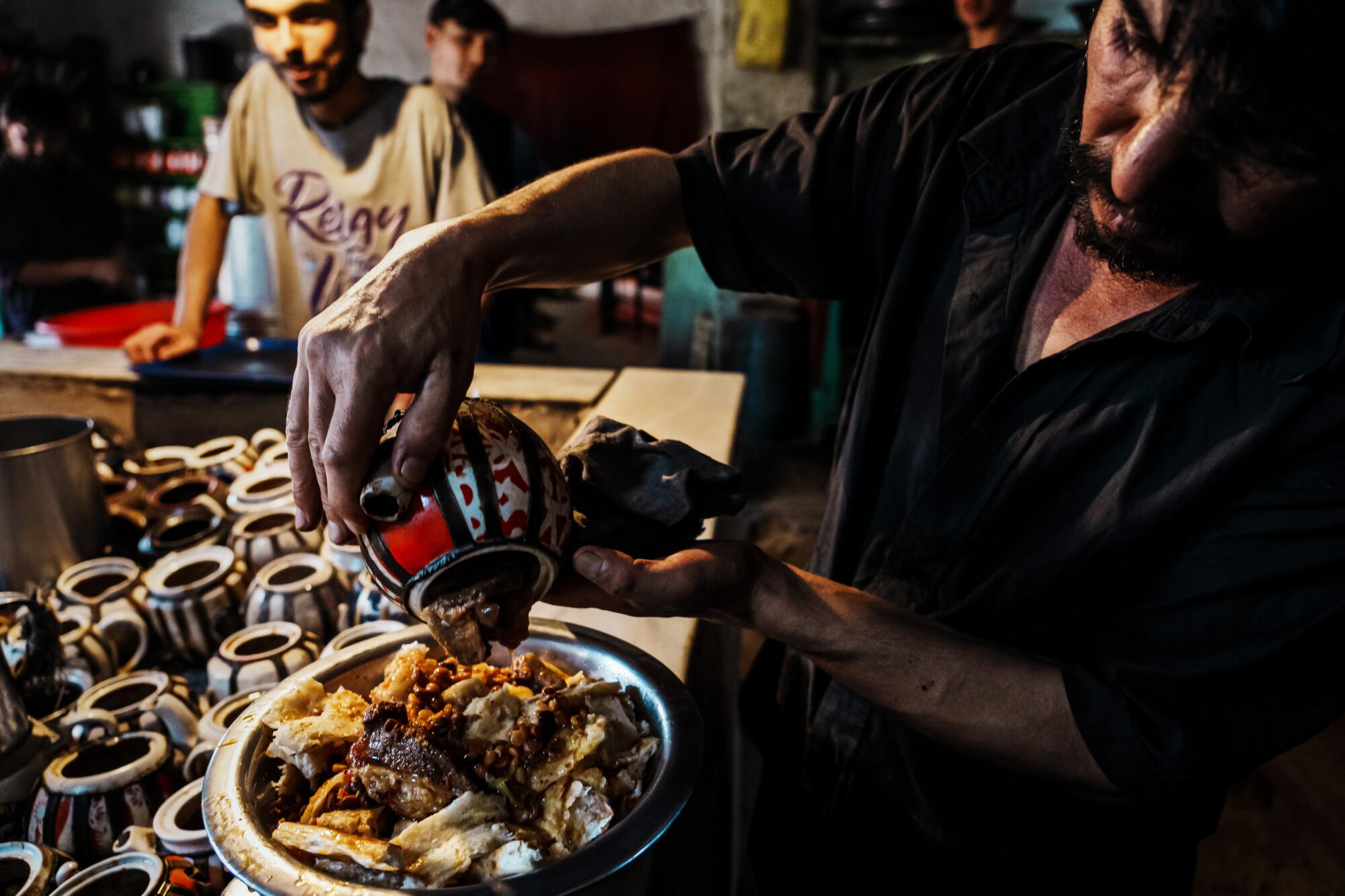
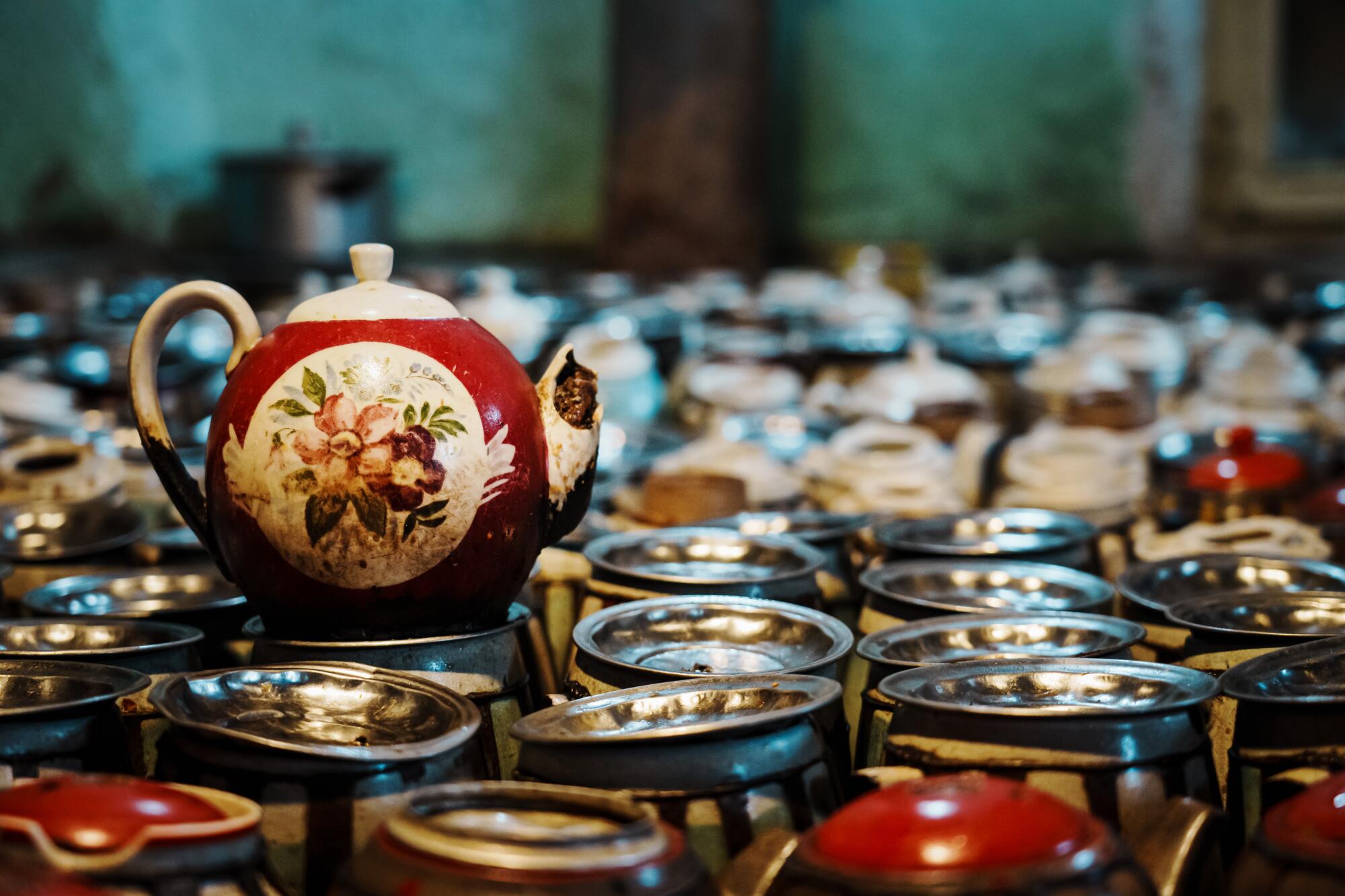
If you want to be a purist about it, you’re supposed to line a bowl with pieces of fresh naan and then pour the chainaki over it to let the juices soak into the bread. Those less into sogginess can just use the naan to scoop up the meat and the sauce.
Whichever way you wish to eat it, the result is superb, with the spices cooked deep into the meat and the chunk of sheep fat (at least one in every portion) soft enough to have the creamy-fluffy texture of a savory tiramisu.
By 3 p.m. — but sometimes earlier — all the 250 chainaks are spoken for, and Merzazadah is done cooking for the day.
“You can’t do it for longer. It takes too long, and we would get too tired anyway,” he says.
News Alerts
Get breaking news, investigations, analysis and more signature journalism from the Los Angeles Times in your inbox.
You may occasionally receive promotional content from the Los Angeles Times.
But he still needs to cut the meat for the next day’s offering. He sits in a corner of the restaurant, arraying three sheep carcasses before him, then slices and organizes the meat into neat piles. He won’t be done before 8 p.m., at which point he’ll go home — only to start the whole process again eight hours later.
Occasionally he feels bored and does sometimes regret not continuing his schooling. But the work has been good to him, bringing him steady money when so many other businesses have shut down.
“What’s the point of learning? If I did, I would be now out of a job, like so many others here,” he says.
Besides, his appetite for the dish he serves to others remains undimmed.
“I love it still. I eat some every day,” he says with a slight smile. “It’s heaven’s gift.”
More to Read
Sign up for Essential California
The most important California stories and recommendations in your inbox every morning.
You may occasionally receive promotional content from the Los Angeles Times.
